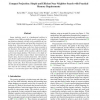Free Online Productivity Tools
i2Speak
i2Symbol
i2OCR
iTex2Img
iWeb2Print
iWeb2Shot
i2Type
iPdf2Split
iPdf2Merge
i2Bopomofo
i2Arabic
i2Style
i2Image
i2PDF
iLatex2Rtf
Sci2ools
117
click to vote
CVPR
2010
IEEE
2010
IEEE
Compact Projection: Simple and Efficient Near Neighbor Search with Practical Memory Requirements
Image similarity search is a fundamental problem in computer vision. Efficient similarity search across large image databases depends critically on the availability of compact image representations and good data structures for indexing them. Numerous approaches to the problem of generating and indexing image codes have been presented in the literature, but existing schemes generally lack explicit estimates of the number of bits needed to effectively index a given large image database. We present a very simple algorithm for generating compact binary representations of imagery data, based on random projections. Our analysis gives the first explicit bound on the number of bits needed to effectively solve the indexing problem. When applied to real image search tasks, these theoretical improvements translate into practical performance gains: experimental results show that the new method, while using significantly less memory, is several times faster than existing alternatives.
| Added | 12 Oct 2010 |
| Updated | 12 Oct 2010 |
| Type | Conference |
| Year | 2010 |
| Where | CVPR |
| Authors | Kerui Min, Linjun Yang, John Wright, Lei Wu, Xian-Sheng Hua |
Comments (0)

